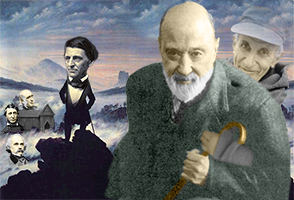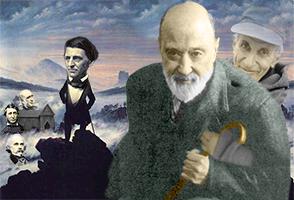
Emerson, Alcott, Thoreau, and Hawthorne
Illustration by Jeff Dunn
Will the “new” symphony by Charles Ives lift you to a higher plane, or send you running from Davies Symphony Hall covering your ears? New York critic Kyle Gann considers the Piano Sonata No. 2 by Charles Ives to be the “one perfect composition.” When he heard Henry Brant’s orchestral reconception of it a year after its Canadian premiere in 1996, he was “blown away,” calling it “The Greatest Symphony Ever (Re)Written.” But when patron Fred Kaufman heard San Francisco Symphony Music Director Michael Tilson Thomas lead Brant’s version in Miami last year, he “ran away after the first movement,” possibly in response to the “low-gear Mahler to deafening cacophony” experienced by South Florida Classical Review critic Lawrence A. Johnson. One thing is for sure: Nothing will be humdrum in the San Francisco Symphony concerts of Feb. 3-6.
To sweeten the pie, the program opens with Franz Schubert’s brief and charming Mass No. 2 in G Major, D. 167, with three soloists and the Symphony Chorus. Then comes the music that so inspired Ives that he had to write a book about it, called Essays Before a Sonata. The title of the piece comes from the Massachusetts locus of literati who called Concord home from 1840 to 1860. Most of these men (virtually all of them were men) were associated with the American Transcendentalist movement, philosophy which promotes personal intuition over church doctrine as a means of reaching higher spiritual planes.
We see him standing on a summit, at the door of the infinite where many men do not care to climb, peering into the mysteries of life, contemplating the eternities, hurling back whatever he discovers there, now, thunderbolts for us to grasp, if we can, and [to] translate ...
The second movement, a scherzo, is devoted to Nathaniel Hawthorne, a non-Transcendentalist, and his “wilder, fantastical adventures into the half-childlike, half-fairylike phantasmal realms.” The third deals with philosopher Bronson Alcott, and his family, including his famous daughter Louisa May, of Little Women fame. The music touches on “the Scotch songs and the family hymns that were sung at the end of each day.” The concluding fourth movement follows moods of Henry David Thoreau (“Let it follow his thought on an autumn day of Indian summer at Walden ...”).
Listen to the Music
III "The Alcotts" (excerpt)
Henry Brant - A Concord Symphony,
III "The Alcotts" (excerpt)
For an example of what Brant has done, listen to the piano and orchestral excerpt from the same sonata passage in the “Alcott” movement. If you like what you hear, check out the concert — and maybe bring earplugs.

